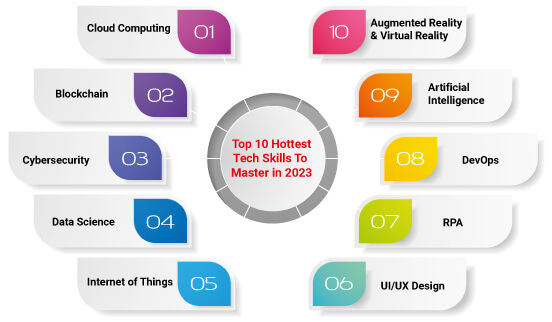Table of Contents
The technology industry is rapidly evolving, and staying ahead of the curve requires a strong foundation of IT skills. As the demand for skilled professionals continues to grow, acquiring the right skills can significantly boost your career prospects. In this blog post, we’ll explore the top 5 IT skills that are highly sought after by employers and can make you a valuable asset in the tech world.
The hottest IT skills

The technology landscape is evolving rapidly, and staying ahead of the curve requires a solid foundation of IT skills. As the demand for skilled IT professionals continues to grow, it’s essential to understand the hottest IT skills that are driving industry trends.
Certain trending technologies are important to know
AI and machine learning as IT skills
AI and Machine Learning: A Powerful Duo. Artificial Intelligence (AI) and Machine Learning (ML) are two interconnected technologies that are reshaping industries across the globe. While often used interchangeably, they have distinct roles.
AI: one important among all IT skills refers to the development of intelligent agents capable of performing tasks that typically require human intelligence, such as problem-solving, learning, and reasoning, to build autonomously thinking, learning, and acting computers.
ML: A Subset of AI
ML is a specific subset of AI that focuses on teaching computers to learn from data and improve their performance over time without being explicitly programmed. Goal: To enable machines to identify patterns, make predictions, and solve problems based on the data they are exposed to.
Specific skills associated with machine learning can include:
- Parametric and nonparametric algorithms
- Kernels
- Clustering
- Deep learning techniques
Security
In the digital age, where data is a valuable asset, security has become a paramount concern. IT security involves protecting computer systems, networks, and data from unauthorized access, use, disclosure, disruption, modification, or destruction.
Threats to technology are evolving along with it. Cybersecurity professionals play a crucial role in safeguarding sensitive information and ensuring the integrity of IT infrastructure.
The following abilities can help you get hired for entry-level and higher IT security roles, such as information security analyst.
- Familiarity with physical, network, and software security
- Installing firewalls and routers
- Data encryption
- Risk mitigation strategy and threat analysis
- Familiarity with compliance guidelines and standards, such as the 2000 Information Technology Act
- Ethical hacking and penetration testing
Programming
Programming is the process of writing instructions (code) that computers can execute to perform specific tasks. It’s the foundation of software development and a crucial IT skillS in the IT industry.
Key programming concepts include:
- Syntax: The rules and structure of a programming language.
- Data types: Different types of data that can be used in programming (e.g., numbers, text, Boolean values).
- Variables: Containers for storing data.
- Control flow: The order in which instructions are executed (e.g., loops, conditional statements).
- Functions: Reusable blocks of code.
Popular programming languages:
- Python: Known for its readability and versatility.
- Java: Widely used for enterprise applications.
- JavaScript: Front-end and back-end developers use this web language.
- C++: Powerful and efficient, often used for system programming
data science and Analytics in IT skills
Proficiency in Data Science and Analytics is crucial in the current data-centric society. They involve the collection, cleaning, analysis, and interpretation of data to extract meaningful insights and make informed decisions.
Key areas of focus in Data Science and Analytics include:
- Data collection: Gathering relevant data from various sources.
- Data cleaning: Errors, inconsistencies, and missing values are eliminated from data to prepare it for analysis.
- Data analysis: Finding patterns and trends in data by using machine learning algorithms and statistical approaches.
- Data visualization: Putting data into graphic form to effectively convey conclusions.
- Predictive modelling: Building models to forecast future outcomes based on historical data.
Data analysis skills will come in handy for a variety of IT jobs. Teams can detect operational inefficiencies or security risks by keeping an eye on performance statistics. Data engineers and database administrators are two IT jobs that deal with data. Some of the tools you could utilize are:
- SQL
- Figures
- Python
By mastering Data Science and Analytics in IT skills, you can contribute to a wide range of industries, including healthcare, finance, marketing, and technology.
Cloud Computing
Cloud computing is a computing model that delivers services over the internet, allowing users to access resources and applications from anywhere, anytime. Instead of relying on local hardware or software, users access these services from cloud providers’ data centres.
loud computing skills are in demand, including anything from building cloud infrastructure to maintaining them.Jobs as a cloud developer, administrator, or architect may become available to you if you work with cloud technology. It can be helpful to be familiar with the following cloud platforms:
- AWS
- Google Cloud
- Microsoft Azure
- Oracle
Common cloud computing models:
- Infrastructure as a Service (IaaS): Offers servers, networking, and storage as well as other essential computing resources.
- Platform as a Service (PaaS): Offers a development platform for building and deploying applications.
- Software as a Service (SaaS): Delivers ready-to-use applications over the internet.
Cloud computing has become a vital component of modern IT infrastructure, enabling businesses to innovate and improve efficiency.
How to acquire expertise in IT?

The following are some methods for gaining the knowledge and abilities necessary for an IT career:
Learn for yourself: You can learn a lot of programming languages, data analysis methods, and some IT skills on your own by doing at-home projects or online classes. Coursera offers a variety of courses, such as beginning Python and cybersecurity programs.
Certifications: Possessing a certification might be a reliable indicator that your skills meet industry norms. Generally speaking, you’ll need to prepare for and pass a test. Check out which entry-level course best suits your needs.
Boot camps: Typically spanning multiple weeks or months, these rigorous classes are tailored to equip you with particular abilities. Although popular, boot camps for coding are not the only topics covered; cybersecurity is one of them.
Degrees: Obtaining a degree in computer science or a similar discipline might be a systematic approach to acquire the technical abilities required to enter the computer industry, even though it may take more time than the other options.
IT Career Growth
The IT industry is a dynamic and ever-evolving field offering numerous opportunities for career growth. Technology is advancing so quickly that there is an increasing need for qualified IT workers. By staying updated with the latest trends, building a strong network, and gaining practical experience, you can position yourself for a successful and fulfilling career in IT.
Utilizing your abilities: CVs and interviews

Once you have the necessary abilities to begin searching for employment, it’s time to put them on a public resume listing. Add your new qualifications to your LinkedIn profile and CV.
Bring examples of your past use of your talents from your experience to share throughout the interview process. It’s acceptable if you have just used your abilities at home or in a course; just be prepared to explain what you were able to accomplish.
Seeking for projects you can finish in less than two hours to gain more practical experience? Check out Coursera’s Guided Projects. They can also assist you in brushing up on previous knowledge to get ready for the interview.
Conclusion
The future of IT lies in AI, ML, security, programming, data science, and cloud computing. Mastering these skills will make you a valuable asset in the tech industry. Stay updated, adapt, and innovate to thrive in this rapidly evolving field.